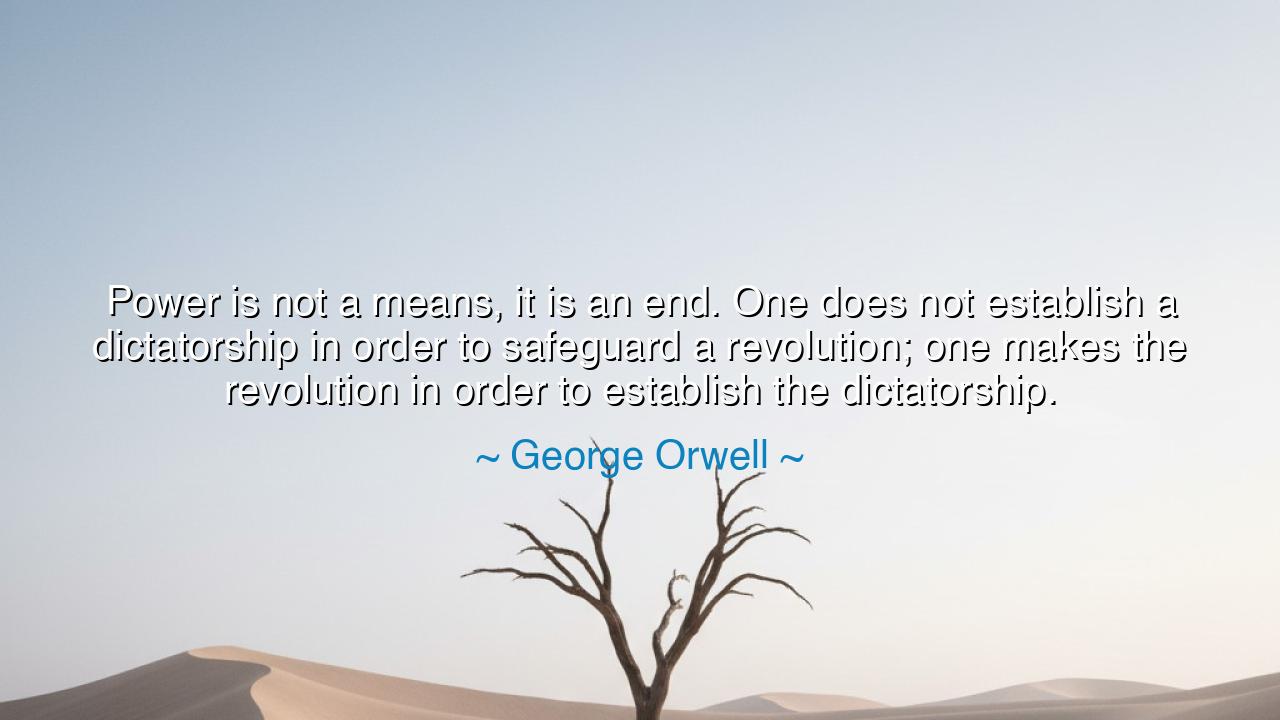
Power is not a means, it is an end. One does not establish a
Power is not a means, it is an end. One does not establish a dictatorship in order to safeguard a revolution; one makes the revolution in order to establish the dictatorship.






“Power is not a means, it is an end. One does not establish a dictatorship in order to safeguard a revolution; one makes the revolution in order to establish the dictatorship.” These words from George Orwell expose the darker undercurrents of power and revolution. Orwell understood the manipulation of ideals — how the cry for freedom and justice can often mask a more sinister goal: the establishment of power itself. In this stark observation, he warns that revolutions are not always driven by a pure desire for equality or freedom, but by the thirst for absolute control. Power, as Orwell suggests, is not a tool for a noble cause, but the ultimate goal for those who seek it.
The ancients understood the dangers of power and the seductive nature of its pursuit. Plato’s Republic grapples with the idea of the philosopher-king, a ruler who governs not for power, but for the good of the people. Yet, Plato was keenly aware of the corrupting nature of power, suggesting that even the noblest individual could be swayed by it. In his dialogues, Plato warned of the rise of tyrants — those who claim to act in the name of justice, only to ultimately use revolutionary ideals as a means to establish control. Orwell echoes this timeless concern, showing that once power is tasted, it becomes an end unto itself, and the revolution is no longer about liberating the oppressed, but about securing domination.
The story of Napoleon Bonaparte serves as a powerful illustration of Orwell's warning. Napoleon rose to power as a hero of the French Revolution, hailed as a champion of the people who would uphold the ideals of liberty, equality, and fraternity. Yet, over time, his role as a revolutionary leader transformed into a dictatorship. The revolution that he once claimed to serve became the tool by which he solidified his own authority. Napoleon, like the figures Orwell warns against, did not seek power as a means to safeguard a revolution, but rather used the revolution to create a lasting empire. His rise exemplifies how revolutions can be hijacked, with power being the true end of those who wield it.
Similarly, the rise of Joseph Stalin in Soviet Russia reflects the very paradox Orwell describes. Stalin, a figure who once fought in the Russian Revolution to overthrow the oppressive Tsarist regime, ultimately used the revolution's ideals as a springboard to create his own totalitarian dictatorship. Stalin’s manipulation of power and his eventual purging of rivals within the Communist Party show how revolutions can be twisted, not to establish justice or equality, but to secure the absolute authority of a single leader. Orwell's words remind us that such leaders do not fight for the people’s freedom, but for their own uncontested rule.
The tension Orwell identifies between revolution and dictatorship is a critical understanding for any society striving for justice. The revolutionary cry for change often sounds noble, but the pursuit of power can easily cloud the true intentions of its leaders. History has shown us that once power is obtained, its holders may reshape their goals to ensure it is maintained. The revolution itself becomes the means, but the dictatorship is the true end. This is the tragic irony of revolutions, where the ideals that once inspired them become the very instruments of oppression.
In conclusion, Orwell's insight serves as a cautionary tale, urging us to recognize the seductive nature of power and the potential for revolutionary ideals to be used as tools of control. Power, when sought as an end, distorts even the noblest of causes, turning them into vehicles for tyranny. Let us remember that the true goal of any revolution must be the freedom and equality of the people, not the consolidation of absolute power by those who rise to lead. Orwell calls on us to remain vigilant, always questioning the true motivations of those who wield power in the name of change.






AAdministratorAdministrator
Welcome, honored guests. Please leave a comment, we will respond soon